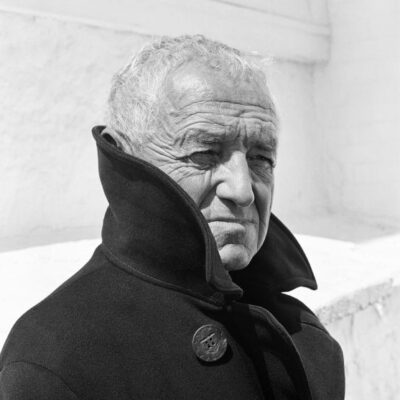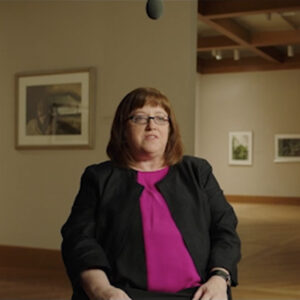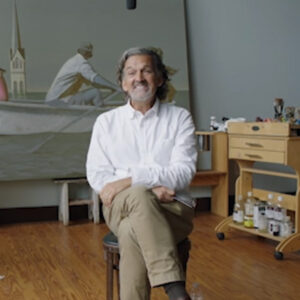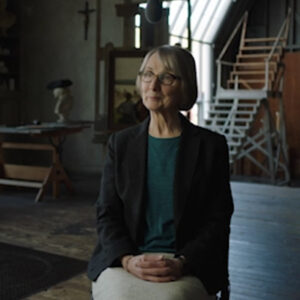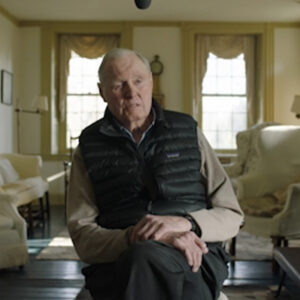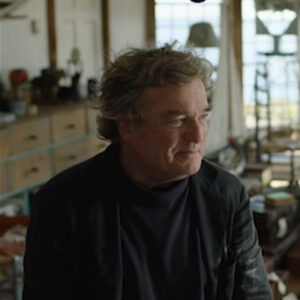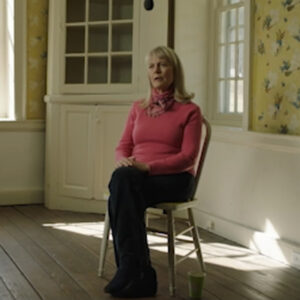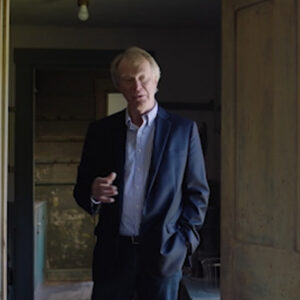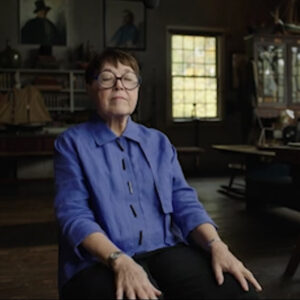Speaker OK, I’m Carl J. Kerner, the grandson of Carl Danna Kerner, who on the third floor of the corner farmhouse, and he and his wife did it quite a few things at my grandparents place, quite a few up on the third floor here. And he painted quite a few paintings here now to name a few, the Kerner’s.
Speaker You know, Carl, when my grandfather was in front of the the hooks and he did quite a few of the Helga paintings up here, what folks used for drawing meat out or my grandmother had used them to put, like, dry onions out and that type of thing.
Speaker Can you speak about Tweek now?
Speaker Don’t we don’t we can you speak about this place and describe it as, you know? It was a working farm.
Speaker It was a working farm long before and I was born my grandfather came over here after the First World War, ended up renting this place and eventually purchasing it.
Speaker And it was a dairy farm, you know, cows, they butchered pigs and so on. So it was a regular working farm. And as time passes, you know, just got a little smaller and smaller. And my late wife at the time had a draft horse and pony and sheep and goats and so on. And and all along, we’re not realizing we did realize it was sort of an iconic place. But you go on about your business, you talk to you about some of the activities that you remember watching your.
Speaker That’s OK. That’s why squeaking but we’re seeing it, too. So I was actually watching that as well. It’s so worth a look.
Speaker OK, is it a leather squeaking? Is that what you’re saying? You know, so I take it offer. OK, I’ll just with that.
Speaker Yeah. Yeah.
Speaker So what when you are a young man, can you describe some of the activity that you remember witnessing and if you can sort of thing?
Speaker When I was a kid, I think growing up I spent 90 percent of my time here.
Speaker And it’s funny because I remember skating a lot on the pond, you know, playing hockey and that type of thing. But during the summer, it’s funny, people would say to me, jeez, you must have a lot of fun playing in the barns or something like that. But we would be putting in hay. You know, it was a working farm.
Speaker So you’re you’re the hired hand for fringe benefits of water. But, you know, it just you know, the work ethic my grandfather had was three days worth of work in one day. So he really wanted to cram things in. Of course, the weather really is your boss.
Speaker So during the summer it was, you know, the hang and and for recreation during the winter, my my father, grandfather and I as a kid, we would hunt certain areas. And but I think growing up, you would see this figure coming in and out, which was Bande and observing him living his life and him observing us living ours. So. You know, my grandfather gave him the free rein of the whole property in the keys to the house, and I don’t know how many people would actually do that, because I think with Andy coming over here from Nancy’s place, it’s just over the hill and through and through the woods to Nancy’s place. I think to any other kid that would be over here, my grandfather would put them to work, you know, but with Andy, I honestly think. Him seeing him coming over here. Not many people know this, but my grandfather’s brother was an artist over in Germany, so my grandfather had this flare towards the arts to to see and observe his life and put it down on paper. But it’s funny.
Speaker I don’t know if my grandfather really realized where all this would take him, because at the end of the day, sometimes. My grandfather load up some Varney’s drawings and start the fire in the woodstove with them, so, you know, if you only knew.
Speaker It’s so interesting to me that you tell that story about your grandfather and his brother and then Andy probably see somebody in your grandfather that felt like his father figure.
Speaker There’s all these layers of connection.
Speaker They’re all intertwined. Like I said, there’s a magic to this place. And I mentioned it before.
Speaker But but I think the biggest thing in this area is this hill over here because it observed everything. Of course, the trees weren’t as high back then. And and to see, you know, romance and tragedy and that whole could talk, but.
Speaker To see how the root system goes here and it’s going to continually grow. So where is here? Where are we talking about just the Brandywine Valley, the Kirner farm, just, uh, you know, it it’s just not going to be stoic.
Speaker It’s going to continue to to draw people in. And like I said, there’s a magic to it.
Speaker Was there any discussion about Andy and his presence amidst between you and your father and your grandfather?
Speaker Um, I’ll have to say. Oh, here’s Andy again. I wish you wouldn’t come. No, no. I think, like, my grandfather welcomed him with open arms.
Speaker And again, like I said with him, I honestly, you know, I believe with his brother being an artist and and seeing this act of creating, I think my grandfather saw it in a way that.
Speaker It was mesmerizing and no, I don’t think we ever said, oh, my God, here’s Andy again, we beat it.
Speaker So go ahead. What is your what are your earliest memories?
Speaker I think coming over here and seeing this figure around the corner and you never know where he would be because he would just find something that, you know, he’s living his life, he’s recording his own life.
Speaker And that’s what he invented to me as an artist, is due to your own life history. And and it goes back to Robert Henry. The only original things you’ll ever do is your own life history. And and he certainly was following that. And I think the lure of my grandfather being in the First World War certainly was a draw to him because he would, you know, you know, some of these or read some of these books that his father illustrated with with some of that. And here’s a veteran, actually a living veteran from the First World War here. So they would share stories with that. But but like I said, seeing Andy.
Speaker Around the corner and just being an artist, I mean, there is there are no rules for him. He made his own rules, you know. And, you know, it’s funny he did paying my grandfather called Spring. He’s out in the snow. And this one, my grandfather is not well. And I would be staying over here with them and being a young artist. And he would leave his studies here. And every night I unbeknownst to Andy, I would pull them all out and see how this master was being a master. And it was so loose and free. And you can learn that in a classroom, you know, but he. And he was very open to me and, uh, I think to see him in the act of creating, you know, that’s almost like watching DaVinci create.
Speaker You said that I don’t exact words, but it sounded like something to like and he was free to live his own life and record his own life. What allowed that freedom?
Speaker Well, I think you was as far as my grandfather goes, or just, you know. Well, I think Nancy just really hammered home that, you know, the romance of the area and and just being yourself, you know, I think to explore. And. Gee whiz, when you look at this area, it’s just mesmerizing, you know, with all the building up, there’s still magic to this. And and knowing that, you know, he was here during the winter months and up in Maine during the summer. Now, there’s there’s so much here. And I remember Andy saying to me one time said, Karl, we have hit the tip of the iceberg of this place yet. And the ways to create without that really did it for me.
Speaker So you studied painting. Can you tell me the story about who you study?
Speaker I when I was a youngster, my early teenage years, my father took some of my drawings over to Carolyn Weiss, who was Andy’s older sister and. I didn’t know he took those over and she ended up wanting to meet me and. So we went over there and Carol is very robust and kind of the the wild child of the the family, I suppose, and she looked at my work and she said, I’ve seen your drawings. And I said, oh, well, that’s very nice. She said, Now go home. And I said, Oh, what? And she said she held up her finger, said, Now go home and do something and mean something to you and I’ll see you in two weeks. Well, that’s all well and good. So home to me is here now. Her brothers here. And I’m thinking, OK, well, I think I would be comfortable doing this, but but Andy’s here and in my mind as a teenager, well, he’s covered everything. So in order for me to get permission in my mind, I had to. Check in with Andy and lo and behold, he’s over at the farm here in the back kitchen painting and of course, everybody in charge for New Andy is Andy’s never Mr. Wyatt. So so we do have our little hellos. Hi, Carl. How are you doing? What can I do for you? And I said to Andy, I said, Do you mind if I paint my own property?
Speaker And he laughed at me. And I said, well, I’m thinking of doing this as a career. He laughed at me.
Speaker He said, Carl, if you follow through, you’ll have your own voice. Go for it now.
Speaker Thirty five years later, he said of a occur.
Speaker If you weren’t a coroner, I would have said, no, this is my turf. But but he watched me grow and and would stop over and see me once a month. And now this is the Andy that not everybody knows, a nurturing father type teacher figure where he would critique me and talk about what it takes to be an artist. And now watching him in action, you know, how many people get the chance to see that, especially a young artist. I’d be very interested to hear if you could recount some of the things that he shared with you about what you said takes two people to a picture, one the and somebody come along and hit him on the head to tell their daughter the words don’t ever work it, uh, you know, again. And looking at this and seeing the magic of it, but the most important thing I think he ever said to me was, Karl, you’re painting it. So if you have something to say. A lot of artists don’t do that, and again, that record your life history and and it’ll be original will be fresh.
Speaker What’s your opinion about what Andrew Wyeth was good at, what was he?
Speaker I think Andy was. Good at.
Speaker Taking a whole fruit of life and just taking a bite out of everything.
Speaker And.
Speaker And just. Enjoy it to its fullest.
Speaker What do you think this room is about, Helga?
Speaker I think the feeling of this, the privacy, the escape of maybe of reality to be to perform his own reality again and explain this one time early, early on coming up over the hill, and you see this little farm. And he felt like, you know, he was in Switzerland just seeing this little farm nestled from the hill.
Speaker And it literally hasn’t changed in. Jesus, one hundred years, you know, just. But there’s an intimacy about this place, there’s there’s a magic. There’s a there’s the excitement of the unknown to which you can explore.
Speaker No, downstairs.
Speaker You do a great and comfortable now, are you?
Speaker I’m the only one here, and so I’ll bet you say that all the guys just say, can we try that again? Yeah.
Speaker So there is you shared a story with this woman we met the first time about India and its relationship with his father and then his father when his father died from his body.
Speaker Are you able to recount that? I think at the time that story was shared with me and this is the first time I’ve ever done this on camera. But my my mother had been blind and bedridden for 11 years, and Andy had wanted to paint her because she had been in one room for all this time and. He had asked my mom if he could paint her and. She said, if you want to paint me, you can go away and never come back because her fear was that he would paint her like my grandfather in spring. And Andy came and told me this and I said, Really? So what she said and I said, Go back to your studio and give me an hour and I’ll talk to my mom. And what I said to my mother was a saint. I really laid into her. I said, you know, he’s going to paint you with the dignity that is unique to you. Well, my mother and Andy were about the same age and they had a marvelous time. And Andy had said to me, I really would want you to paint or I said, Andy, I feel too close to it, you know? And he said, well, I’m going to go ahead. And that’s when she said, don’t come back. But but they end up having a marvelous time sharing a lot of personal stories with the tragedy of ency passing. And my mother’s first fiancee being killed in World War Two about within a month of Enza. So they both face tragedy and had a chance to share that and. We were at my studio one day in the midst of this and he’s saying, I really want you to do this. And he says, I want to tell you one story. And it’s about my father and he was up in Maine when Nancy was killed and he said, Carl, what I’m going to tell you. I want to make sure that you understand this the day of the funeral. And he wanted to see his father and little law laid out, and the elder, I guess, at the Birmingham meeting said and he really should you want to remember your father as he was vivacious and so on, and and he said, I wouldn’t hear anything of that. I wanted to spend some time alone with him and. And he said to me, I went into that room. And it was late October, the windows were open and I saw the light come across my father’s face and the.
Speaker Wind at the wind is blowing the leaves, crossed the window and. And he sounds to me, as tears are starting to well up as if he’s reliving it. He says, I had to do that to spend time with it and seeing the beauty of the wind and the light across his face. I this is what I’m trying to tell you, paint your life history, do the things that mean something to you. I really want you to follow through with this. And I’m crying now and he’s crying, you know, and he’s reliving this whole story and he said, this is what I’m trying to point out to you, to do the things. Or your own. And and to share that, I don’t know if he ever did share that with anybody else, but took it to a young artist. This is maybe 15 years ago, maybe not quite 15. But and he said, I don’t want to be too hard on you with this, but this is what I’m trying to tell you. Paint your life.
Speaker I have two questions for that. Sure. Yeah.
Speaker Sorry. Thank you. OK. Appreciate that. So am I. I thought you quickly. Did you paint your mom? Yes, he did.
Speaker Yeah. As total pillow talk watercolor, dry brush. And later on, he said to me that was his emotional. I was doing Christina’s world to him. That’s you know, that was the that threw me when he said that because Christina’s world is iconic and I’ll talk to my knowledge hasn’t been shown. But and it’s just a it’s a wonderful dry brush when it’s in the vault. The museum, as far as I know, it’s Marilena.
Speaker Yeah. In the sand that I have, which is so interesting. And that particular art. Sure. It really sounds amazing. Please encourage you to paint his paint your life.
Speaker But he’s painting other people’s lives.
Speaker Yes. Well, I think what he’s saying paint my life, my life experiences, the people that I know, the people that I you know, I’ve gotten to have a relationship with friendships. Do the things that mean something to you, do your own life history. That’s what I mean by that. That makes sense. OK.
Speaker I’m wondering what the response to the people in your family see the paintings that he made?
Speaker Well, I think when my my family sold the painting spring. My God, how in the world could that man do that? They did not like that at all. But you know what? The old saying is better to ask for forgiveness than permission. And I get it. And they looked at it as what it was, but not with the meaning behind it, where a farmer that works the ground all his life returns to the ground. And that’s the the magic of that. So there’s a lot more to it than just a man laying in the snow. But, you know, I mean, I think a lot of the families, you know, thrilled that Andy was, you know, turning this place into something special. But if it wasn’t here, you know. Know one hand washes the other, so to speak. What do you mean? Well, the farm wasn’t here when Andy be here, you know, and and, you know, if Andy wasn’t here, the farm would still be just a farm, so.
Speaker And so interesting that, um, and he wasn’t any of them, but he’s really pointing out people.
Speaker Oh, my God. Yeah, yeah. You know, it’s, uh, it’s a living history with without. And the paintings will always be, you know, have a life of their own. So you just don’t do it and then that’s it. You know, I mean, Andy painted something that was more than I think an average artist would ever see.
Speaker What are the questions about the work that you identify with that really senju with his work?
Speaker Physically or spiritually or emotionally or all right. Well, I think the technique with with what he what he does is, you know, it’s just seeing him so zoned in on an egg tempera where he really wants to to make it count because you only have one life and making it emotional. Of course, somebody is going to take something different from every single painting. And, you know, so you have this love, hate relationship with some some work. Some people hate it. Some people will love it. But he captures it all in between. You know, he goes from one gavitt to the other. And and the whole thing is he he didn’t care what other people thought.
Speaker He just did. He didn’t have to care all he did. So that’s kind of like.
Speaker The the physical thing, but what about the spiritual side that I believe brought up? I mean, one of the things that I think.
Speaker With with his work. For me personally, it takes me to another level where.
Speaker He paints the soul, not just that image and whether you’re a writer or a sculptor or a musician.
Speaker I think you could look at his work and apply that to any other medium, too, because it takes you there.
Speaker And the hill that you that, yeah, you speak about that and the connections and his work and his life.
Speaker Well, I think the hills like just the iconic I bet it has seen his birth scene, his life and has seen his passing and has the battle of Brandywine. It has seen it all and it’s going to continue to do that, you really should interview the Hill and see what it has to say, probably much more than what I have to say. Don’t to me. But I’ll say this. If you go up on that hill, whether it’s December or April or October, any time of year, you go up and just listen. Forget about the traffic and hear the wind. It has. A voice of its own.
Speaker For people who don’t know the neighborhoods as well as you do and as well as I’m learning about it, can you sort of just lay out the key spots and see house any studio, this farm like the fact that it was can you call his neighborhood?
Speaker I mean, it’s all for people. You know, of course, a lifetime they call white country, but it goes much more than that. I Chadds Ford is nestled in the, you know, a valley that has seen it grow, but it still has its natural qualities. So, like I say, with all the building here, there’s still.
Speaker An innocence to it.
Speaker I think with with what Frolich did know and creating the Brandywine Museum.
Speaker Has put a stamp on it.
Speaker I agree, and I like the word nasal because that’s what all these people.
Speaker Yes.
Speaker So could you describe this for people who don’t know the area physically, that the farm is near the way like that?
Speaker Oh, wow, we were within about maybe less than a mile walking distance from and his house to the corner property and. You know, we were just right off Route one. I don’t know if that’s what you’re exactly looking for me to say, but.
Speaker Now, I think if you if you start at one in one hundred or they call a creek now Creek Road now you can go any direction for a mile or so and you’re still in this artistic, magical kingdom.
Speaker So any water? Sure. Sure. And he did golf and.
Speaker How often how often do you have a sense of like how can he be here during the winter?
Speaker Probably in the 60s or 50s? Well, say the 40s, 50s, 60s, 70s.
Speaker Now, he would get home from Maine right around October and right around Halloween and and soon you start to see him either walking over or as he got older, you know, driving over, driving up on the hill.
Speaker And you knew he would be on to something. You know, when he was doing Snow Hill, you would see him up there every day and you say, OK, something’s going on. And when he finished it, he called me and said, I’d like you to come over and take a look at this, because, you know, I mean, we’re right there, you know, so, you know, curiosity. And I mean, that was that was a thrill for me to have him come over and say, come over. I want to see what you think, you know. So it’s a tremendous respect to a young artist.
Speaker So he said the 40s, 50s, 60s and 70s, 80s, 90s, up until he passed away 40 or 50 years.
Speaker Yeah, more than that, probably, you know, I mean, how could this keep his interest?
Speaker Like I said, he told me, Carl, we are going to hit the tip of the iceberg here yet, I think.
Speaker Maybe familiar already. Spawns creativity. And. Creativity spawns familiarity. So it’s a it’s an ongoing circle. An exciting one to.
Speaker When you would see him around, say, for example, with the snow. Yeah. What basically was he doing?
Speaker Well, of course, and he’s very private, but, you know, doing his studies. You know, it’s interesting, if I would come up to him and he saw me coming, he would always pull his drawing pad to his chest. You know, you know, just no privacy, you know, I don’t think he wanted anybody to see something until it was finished, unless he was doing the person himself, because I think the smallest comment could sway the artist to go one way or the other. And you don’t lose your your drive where you were going.
Speaker And what he had to do is bring these alarms are panning out in the field or I don’t know, I never saw really use an easel outside.
Speaker I mean, he would be in a suburban or just, you know, have the pad under his arm and and whether it was a bucket or whatever, you know, you would find that would be as easily as lidded against their, you know, very utilitarian, like my grandfather use whatever is their.
Speaker And from your point of view as a painter and the snow in this landscape is about what was it that sort of the physical aspect you talk about in rolling hills? And sure, there’s a color scheme here and you talk about the colors.
Speaker Yeah, yellow, of course, robbers burned is very earthy. You know, you look at you look at Andy’s work, a common of saying, well, jeez, it’s very, very deadlocking.
Speaker It’s very earthy, like you said, Browns. And but during the winter, that’s what you see, you know, I mean, maybe it’s a little different, but and he kept to that that palette and, you know, and worked magic with it, you know, and, you know, he would surprise you once a month or some color.
Speaker And you have to speak about the historical winter and what was attractive.
Speaker I think the. I think one thing that that at least from my point of view, his love, just seeing it actually snow.
Speaker You know, just just to be in that outside and just listen to the snow and and yet somehow take that experience and take it back to the studio and and paint his own reality from it. And I think that’s. You know, being outside and just experiencing experiencing it really comes down to. The art of observation. And. Oh, yeah, well, you know, patience is something that you deal with.
Speaker How about his personality? I mean, I know his work beautifully.
Speaker I don’t know him as a human being, a great sense of humor, impish, just like to have a good laugh. They’re just. How can I say just. Spark of the devil in the eye once in a while, you know, just to. Stir the pot.
Speaker We and we also discussed this, but I enjoy the fact that we never had to worry about the details of life, that most of us have to worry. Right. Um, did he ever reflect on that?
Speaker I think, uh. And she was a great provider. So I don’t think I had to worry about paying electric bills or saving the batteries, I got to pay this phone bill this month. I mean, his his mission in life was to be an artist. And he was blessed with that opportunity. And as he as he said before.
Speaker But I worked at it. He didn’t just goof around, obviously. You can see that every day. Yes.
Speaker You know, um, Kathy bought us that painting. A statue was like breathing for sure.
Speaker I mean, he was like a conductor was symphony. And just to see his hands actually go through a drawing and you put it to music. It would be like a symphony.
Speaker Thank you for that challenge. Could we talk about how all of you and the so-called the story broke?
Speaker Uh, Helga and Johnny, her husband, moved here in the early 70s.
Speaker And. You were aware of.
Speaker The creating part early on, so I was aware of it pretty much right from the beginning.
Speaker When when the story was became big news, I was wondering what it felt like here. What changed?
Speaker You have this small, smaller area and the day that it broke. In the morning, I had a call from USA Today. And. They want to know about the Helga’s Helga paintings. Well, Carolyn had told me this is you know, you want to keep this under your hat. So I said, I really don’t know what you’re talking about. And less than five minutes later, the phone rings and it’s Carolyn. It says, anybody call you about how good the paintings? I said, yeah, as a matter of fact. And she said, Oh, my God, it’s out. I’ll call you back. I didn’t talk to her the rest of the week and within I’d say an hour that we had USA Today, Time, Newsweek. You know, the papers from France just zeroing in on the farm here and wanting to know all about this and where Helga lived. Well, and Helga, there were some up in Maine when this happened. So we’re scrambling around on our own, like, what do you do? And by the end of the day, this is kind of funny. We’re still protected. Where where where’s Helga live? And I said to somebody from time, I believe you really want to know, OK, you wore me down. I’m going to tell you this, but I’m going to tell anybody else you can do whatever you want with it, what you want to do is go out the end of ringroad, go out, make a left. You go out past Longly Gardens, out the Route one bypass. It’s about forty five minutes away. And where I came. Instruction to the T to a place I never even knew, I never saw him again, so I took care of that.
Speaker The reason I was here, I remember seeing it on television.
Speaker Yes, there was a lot of hubbub about it. Yeah. You know, I mean, my father, my my grandfather’s son came. I said, I’m sick of this. I’m going to go and tell the the Channel six ABC News that, you know, they’ve been on the farm. I’m going to get rid of them. I’ll be back in 15 minutes. Well, now goes by and this tells you a little bit about my dad and. They don’t show up and finally comes back. So where were you? He says, I’m going to be on the six o’clock news. He couldn’t resist.
Speaker So anyway, it speaks to, you know, people’s. The National Enquirer made sure, but another really interesting side of it is, is in the Andrew Wyeth’s prolific penis.
Speaker Oh my God. Yeah, well, that’s what he that’s his life’s calling to produce.
Speaker You know, I don’t think a day went by when he didn’t do something, you know, I mean, you’re an artist 24 hours a day, you know, now maybe you have that for me personally, you may work eight hours and get nothing done the next day. You have forty five minutes and you get eight or eight hours worth of work done. And and you say how in the world you do that, you there’s no formula. If you make it a formula, you’re in trouble.
Speaker So what do you think, if you can put into words and how you can try? What is the impact that knowing end of life has had on?
Speaker I think knowing the whole wayas family. They started with Carolyn and knowing Andy the way I did.
Speaker Andy took care of me in a way. That’s not commonly known only because he saw a young artist.
Speaker He would spend time. Helping me.
Speaker Not I wouldn’t say helping me, but discussing what it took to be an artist, nothing about this is what you have to do here or whatever, but for somebody of that nature. Who basically is world renowned and take.
Speaker Time one on one. To see.
Speaker A sharing of his life’s calling to a young artist, life’s calling. And share his knowledge. And.
Speaker Lack of excitement. To me. To say this is something that. We’ll just grow.
Speaker And you’re going to have your own challenges, but, my God, make it make it count. And to have somebody like that is very unique for me, but again, to us, it was just and, you know, and and separating, it’s just dandy to this iconic figure and having him take the time. Whether it was an hour or two hours or whatever and spend with you talking about life, you can’t put a value on that.
Speaker A very nicely stated. I’m wondering if you could I should ask again.
Speaker I don’t know if you can talk to me about your grandparents and just sort of tell me about who they were and what they were like as people and what their relationship was and what may be. And so I know you talked about your grandmother being alone, right? Sure.
Speaker That’s a big part of what I think about you because you shared a name. Well, my grandfather’s name is Carl Carl Wilhelm Khurram. And like I said, my grandfather had a very unique work ethic now and. Three days of work on one day and that type of thing had a unique sense of humour, which I didn’t see that often, but I know he did from my my aunts and my cousins who are older than I am not very often, as my grandmother talked about and a very. How can I say not secretive, but I wouldn’t be the right word, but just private and yet. She and I had a very good relationship.
Speaker I thought, you know, she had some issues and earlier in her life and my God, they came over to Ellis Island and and so on and and ended up here and and my grandmother.
Speaker You know, just was very, very work oriented, she would sweep the barn yard, the barn would be spotless, not like it is today, but I think.
Speaker She. A lot of times I didn’t have time to pose, Randi. You say you yeah, but but she ended up doing, you know, doing some and I thought some of his best work was of her. And she knew how to hold a pose, that’s for sure. You know, just like a statue.
Speaker Wondering what you think of now when you look at those paintings, do you see the people that you knew, when you see the people that any new hey, that’s kind of nice, isn’t it?
Speaker I think the underlying lairds of people, you know.
Speaker To an outsider looking in there, there’s a story, maybe unbeknownst to them, that draws them in like a magnet, you know, because I think every painting has a. A mystery to it that only the artist and the subject now. That will never be shared in reality.
Speaker Are there any pain to just blow you away that knock you out of Andy’s?
Speaker I think. You could ask me that every day, and I probably give you a different answer. She’s off hand, you know, just look at Springford, you know, there’s a painting you can hear.
Speaker And.
Speaker It describes the whole country farm to a T.. And then you look at one of the paintings and he did of the Hill like winter 1946 and the emotion of that.
Speaker It takes you to a unique mental state for me and you look at the things he did up in Maine, you know, like, you know, and I don’t want to say Christina’s world because it’s so well known, but the whole body of work of her and their relationship and how special it was.
Speaker I’m glad you’re going to spring that through. Yeah.
Speaker Can you talk about what that physical thing is and how it functions on a farm? Because I think a lot of people don’t even know.
Speaker Well, it’s helped to cool the milk, you know, put it in after the cows. Are you put the candidate to take all the milk? They used to be runners that would take the milk from the stalls where they milked, integrated to there so they would kill, cool the milk and then they would be taken away. So and of course, always fresh water running water in there to the fact that you were just going to get to the point that you say take them there.
Speaker Can you describe for people what that is?
Speaker What’s what is it like a bath? Oh, it’s like well, it’s like a well, it’s like a little tub, I guess, you know, it’s always he’s really asked me what it’s if you go to The Beverly Hillbillies, it’s a cement pond for midgets.
Speaker So but, uh. But it’s smart. It’s always cool. As cool as it is now in winter, it’ll be just like cold and summer too, which is what it used to come from a spring on a hill. There’s all gravity fed.
Speaker But eventually, as time went on, the pipes needed to be replaced. So now we have a well put up there or up here and it just constantly runs so it doesn’t freeze. Thanks. He did really.
Speaker Oh, my God, your God, you know, it’s like I often think before we’re born, we’re hanging around God and and asking, what’s it like to be you?
Speaker And he says, if you really want to know, make your own hours, you can be a creator.
Speaker So Andy was his own God.
Speaker You know, we spent its money, so the crew painting that I can’t see the house from here and it’s like, oh right, right.
Speaker So you’re the great manipulator to make it work.
Speaker And I guess that’s where the sketch is coming. Absolutely.
Speaker So you’ve done a great job.
Speaker I there’s one thing that you said in our interview that I would love to see if you could just repeat it if necessary. But you said and repeated ideas. Is that is that.
Speaker I see. I think Andy painted.
Speaker It’s a very intimate part of his life and to paint that intimacy. And sharing it with the public. I don’t know how many people could do that. Because you’re opening up a private world and and sharing it and. That’s a very tough thing to do.
Speaker Sounds great, but is.
Speaker I think it’s great. You want to share with me that I didn’t touch?
Speaker No, I mean, this is your this is your toy.
Speaker So a lot of times with their gifts and so.
Speaker Well, I think the gift that Andy is giving is is not necessarily the work, but it’s the idea of. Creating is endless. And that’s something that the world can thank him for.
Speaker OK. I would like to thank you for that statement.
Speaker Are we are we are we good for time that we have time for to take some snaps of action against? That’s a good question. What did it look like when you were doing his meeting with cancer?
Speaker I’ll tell you one thing where I really, really blew me away. I was coming down the farm driveway one day and he was paying by the spring house. He wasn’t really frustrated because he’s sitting there and also he gets up and throws the pig in there. It’s like a Frisbee and it’s coming down, down, down, down. And it lands on the ground.
Speaker And he gets up.
Speaker And puts his arms behind her and walks around and just studies it.
Speaker And I caught I didn’t know what was going on his mind. His he he respected his work enough to abuse it and whatever he did. There was no holds barred. So he did whatever he felt made it work.
Speaker So you never pick that one up again? I think he did, yes. That’s a great story at this point about him rubbing dirt on it. Yeah, yeah, yeah.
Speaker He did whatever he did to make it work. You know, he didn’t have to. There’s no rules. You make your own rules. He didn’t go to art school, you know, school, his life, his father to bring that, like I said earlier, to bring that romance of what his father did and take it to a, you know, your own level.
Speaker I mean, you know, let’s face it, his early work look just like ANSYS and eventually have to branch off and be your own person. Jaimie’s early work looks just like Andy’s. Eventually he becomes his own. My work looked just like Kerman’s early on. You branch off, you come to a fork in the road, you take it. You don’t have to go to the right. You just take it wherever you go.
Speaker He has said that the father at the pivot among the families is part of that. Sure.
Speaker Uh huh. You know, like I said, that story that he told me to really drive that point home because you never know where life’s going to take you. But seeing him go back in time. And literally seeing those tears come out of his eyes. You know, I mean, gee whiz, we could have kept Scotties in business that hour because he was you know, he was reliving that and saying, Carl, this is what I talk about. You have to. Strike. Why you can that that. It’s it’s life, it’s your life history. Make it count.

